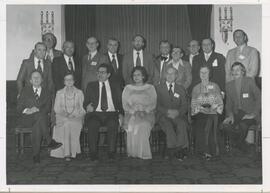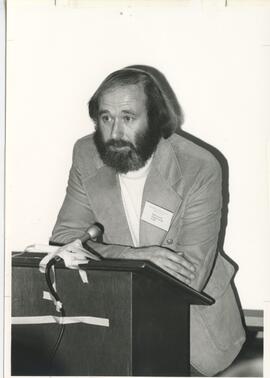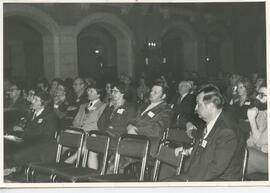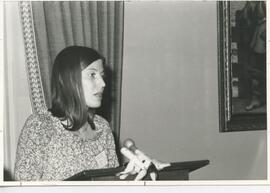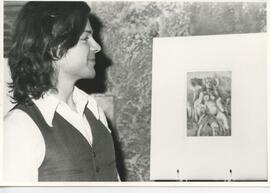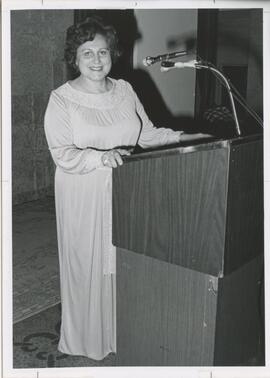This item is an audio recording of an interview conducted with Waldemar Hildebrandt on January 19, 1982. The interview covers the history of Hildebrandt's family living in Radomyshl and Kyiv area and his membership in the Komsomol Youth organization before the war (side a). The interview also covers his involvement in WWII, first as a member of the Soviet Army and then the German Army and then as a Prisoner of War, before becoming a cook for the American Army (side b).
Hildebrandt, WaldemarThis item is an interview conducted on June 15, 1981. Veronica Whitfield interviewed Mr. Herklotz. Mer. Herklotz talks about his family, being in the Soviet Army in WWII, and coming to Canada in 1948 and learning English.
Whitfield, VeronikaThis item contains an interview with Mr. Eichele and Mr. Louis Oel, conducted in Calgary, AB in German on August 25, 1982. Content of the interview contains discussion on their school years – walking about 3 km to the school. The important role of the priest and church – every morning had to go first to the church. On weekends, visited the church twice or even thrice, The Albert Cattle Association, paying big taxes while being unemployed, and taking over an agency in Calgary
Eichele, Mr.This item contains two interviews, one conducted with Mr. and Mrs. German, and another with Mr. Eichele. M. German was born in 1909 in Odesa, although originally the family came from Germany and spoke German. His parents were farmers. They came on a steam boat from Liverpool to Halifax, they then came to Regina on a train from Halifax where he had an uncle, and moved to Alberta in the Spring of 1910, to Bow Island, an area with many Germans. His dad built a house, which was more like a shack, where they had some animals. His dad grew wheat. He took over his dad’s farm. During WWI, when they already lived in Canada, his family did not have problems because they were Germans, although they did experience tough times during the Depression. Mr. and Mrs. German got married in 1924, then bought the land. In 1940, they came to Calgary. Then sold it and bought the lot and built the place they were being interviewed. Retired in 1968. Have 2 children. Mrs. German's parents came from Russia, too ([Menheim] near Odesa). She was born in the USA, in Mackintosh, North Dakota in 1907. Her parents had a homestead over there. Then they moved into Alberta in about 1908. Her father got a homestead in Alberta. They moved together with a big German community. She had 6 siblings and was the youngest, 2 from the previous marriage of her dad. Her family was Catholic and spoke German.
German, John LennardThis collection consists of audio recordings and photographs. Recordings include news/talk shows, interviews conducted for CEESSA, and meetings and conference presentations from CEESSA. They cover diverse topics such as: problems in Central and Eastern European studies at the time and how universities and their departments function, immigration, politics, languages, daily life, life on the Canadian Prairies, life in Canada during WWII, CEESSA’s organization, goals, and projects.
Central and East European Studies Society of AlbertaThis item contains recordings from the Second Banff Conference on Central and East European Studies.
Presentation by Mr. Petr Czarnowsky: Eastern Europeans, despite their proportion of the population, came to form a large number, often over 50% of ethnic associations in Alberta. This includes ethnic organizations, arts organizations, and linguistic schools. Policies of multiculturalism have helped to form these figures, but have had the unforeseen consequence of adding to confusion about Eastern European ethnic groups on the part of students and teachers alike.
Presentation by Mr. Joanna Mateko on the problems already being faced in the study of Poles. She came from Poland associated with the Polish Academy of Sciences in Warsaw for 15 years. She did work in the field of Polish history, having published numerous articles and co-author of bibliographies that were compiled by the Polish academy of sciences. She does her research on the Poles in Alberta. A problem that exists in the study of Poles is the inaccuracy of academic and official documents pertaining to Polish settlement in Canada, and the difficulty in unearthing accurate depictions and statistics of Polish settlers, and Slavic settlers more generally. This can be derived from a lack of knowledge from Canadian officials, and a lack of consciousness amongst many Slavic groups, particularly the Poles and Ukrainians.
Presentation by Mr. John Sokolowski, a graduate student in the department of Slavic Languages, his first graduate program was as a Classicist. He does work on the Russians and Belarussians. He started his work on the East Slavs, the Russians, Belarussians, and Ukrainians in Alberta. They no longer work on the Ukrainians as so much work has been published. They started their study with the Russians and Belarussians, they hope to determine an accurate number of people of Russian and Belarussian origin in Alberta. Contention on the accurate number of Russians and Belarussians in Canada, as the definition of Russian has changed over time, with many early documents associating many non-Russian ethnic groups as Russian. Dynamics have changed with census records over the years, which still continue to be unreliable. There is thought to be far more Belarussians in Canada than official census documents would suggest.
Presentation by Mrs. Dr. Yermilla Horna University of Calgary Department of Sociology. Dr. Horna was educated in Prague and Bratislava came to Canada in ’58, taking part in the project doing the history of the Czechs and the Slovaks. She got a grant for the study of patterns of adjustment of Czechoslovaks, the so called refugees of 1968-1969. The study focused on pre-1968 settlement of Czechoslovaks in Canada to figure out if incoming refugees had a previous basis to go off of, or had to ‘start from scratch’. Research found majority of Czechoslovaks came to Alberta as miners, farmers, or other labourers, mostly from Slovakia. Greatest wave of Czechoslovak migration prior to 1968 came in 1885.
Presentation by Mr. Kostash: Talks about the function of universities. Talks about how East European and Soviet Studies at the university follows the same functions. Mentions that one who takes particular focus on the East European courses offered by the University can find themselves being skilled and knowledgeable scholars. Initiatives by professors at the university to make sure students in the field go out to the ethnic communities to get a feel for how they are. Talks about the importance of community approval and funding for new programs. Stresses transparency of activities in programs as it relates to the community.
Presentation by Mr. Duruviches, a member of the Lithuanian community, and President of the Baltic Society: Discusses the contention with the label ‘Soviet’, coming from Lithuania, and the history Lithuania has with the Soviet Union. The importance of having a place such as a University to study one’s heritage. Expects from the University that it is kept in mind that although their issues are similar at the moment, that Baltic peoples are not Slavic peoples.
Presentation by Dr. Bergin from the Faculty of Education: has a strong interest in Mennonite culture. Difficulties because of mixed loyalties on representing different groups; particularly the Mennonites, who aren’t easily identified by typical visages.
Presentation by Dr. Sukoversky: the definition of a collection, and that professors start collections. Students can start collections too. Ethnic groups can start collections.
Presentation by the Chairman of Edmonton Historical Board
Presentation by Mr. Kistner: Wasn’t prepared to present but is talking from the perspective of a foot soldier. He is Baltic German born in Tallinn Estonia. Talks about how maps often forget about the islands of Estonia. Baltic Germans is a very small group. It’s worthwhile for even very small groups to write their history and preserve their heritage. In doing work there’s lots of assistance needed, time, and footwork. Being a small group has its advantages, no need for sampling.
Continuation of Presentation by Mr. Petr Czarnowsky: Eastern Europeans, despite their proportion of the population, came to form a large number, often over 50% of ethnic associations in Alberta. This includes ethnic organizations, arts organizations, and linguistic schools. Policies of multiculturalism have helped to form these figures, but have had the unforeseen consequence of adding to confusion about Eastern European ethnic groups on the part of students and teachers alike.
Presentation by Mr. Joanna Mateko on the problems already being faced in the study of Poles. She came from Poland associated with the Polish Academy of Sciences in Warsaw for 15 years. She did work in the field of Polish history, having published numerous articles and co-author of bibliographies that were compiled by the Polish academy of sciences. She does her research on the Poles in Alberta. A problem that exists in the study of Poles is the inaccuracy of academic and official documents pertaining to Polish settlement in Canada, and the difficulty in unearthing accurate depictions and statistics of Polish settlers, and Slavic settlers more generally. This can be derived from a lack of knowledge from Canadian officials, and a lack of consciousness amongst many Slavic groups, particularly the Poles and Ukrainians.
Presentation by Mr. John Sokolowski, a graduate student in the department of Slavic Languages, his first graduate program was as a Classicist. He does work on the Russians and Belarussians. He started his work on the East Slavs, the Russians, Belarussians, and Ukrainians in Alberta. They no longer work on the Ukrainians as so much work has been published. They started their study with the Russians and Belarussians, they hope to determine an accurate number of people of Russian and Belarussian origin in Alberta. Contention on the accurate number of Russians and Belarussians in Canada, as the definition of Russian has changed over time, with many early documents associating many non-Russian ethnic groups as Russian. Dynamics have changed with census records over the years, which still continue to be unreliable. There is thought to be far more Belarussians in Canada than official census documents would suggest.
Presentation by Mrs. Dr. Yermilla Horna University of Calgary Department of Sociology. Dr. Horna was educated in Prague and Bratislava came to Canada in ’58, taking part in the project doing the history of the Czechs and the Slovaks. She got a grant for the study of patterns of adjustment of Czechoslovaks, the so called refugees of 1968-1969. The study focused on pre-1968 settlement of Czechoslovaks in Canada to figure out if incoming refugees had a previous basis to go off of, or had to ‘start from scratch’. Research found majority of Czechoslovaks came to Alberta as miners, farmers, or other labourers, mostly from Slovakia. Greatest wave of Czechoslovak migration prior to 1968 came in 1885. The recording cuts out before she can say more.
Unknown speaker: Speaking about the contentions in someone’s paper about the status of Jews in the GDR. States that even in extremely religiously repressed countries, religious leaders will proclaim how great the religious freedom they feel is. The GDR, being like the Soviet Union, is not unique in this when it comes to their Jewish community. The GDR is anxious to keep up a good image, and the Jewish Community, being small, is very easy to finance. In West Germany compensation for victims of the Nazis was given, while in East Germany no such thing was offered. Thus the number of Jews in East Germany is not representative of the Jews who originated in East Germany that survived the Second World War. Speaker questions why, after the description of Pensions in East Germany, that Canadian and American Jews aren’t busting down the door of East Germany to live in “Honecker’s Paradise”. The recording cuts out.
Unknown speaker: Many of the Jews they’ve talked to report being economically and socially happier in East Germany as opposed to places like Riga or Warsaw. This applies particularly to Polish Jews. Jews would apply to the East German Ministry of the Interior and through their own nations to request to leave. Being in the same bloc this was not difficult. There are only about 800 registered members of the Jewish community in East Germany, but this number is more realistically over one thousand as non-registered members of Jewish descent. [There is an interruption in the tape.] Jewish citizens of the GDR feel fully committed and loyal as citizens of their state. Immigrants coming into a society are changed by that society.
Meeting that relates to University relations as it affects Eastern Europe. A speech about the importance on the stance of the University for talking about these topics which relate to a large portion of Northern Alberta’s population.
A change in the panel composition: the addition of Dr. Sukhoversky, who is well versed with the University Library, which has many volumes relating in foreign languages and in English, about Central and Eastern Europe. The deletion is Mr. Afigannus, who was to be here as an observer not a panelist.
Presentation by Mr. Kostash: Talks about the function of universities. Talks about how East European and Soviet Studies at the university follows the same functions. Mentions that one who takes particular focus on the East European courses offered by the University can find themselves being skilled and knowledgeable scholars. Initiatives by professors at the university to make sure students in the field go out to the ethnic communities to get a feel for how they are. Talks about the importance of community approval and funding for new programs. Stresses transparency of activities in programs as it relates to the community.
Presentation by Mr. Duruviches, a member of the Lithuanian community, and President of the Baltic Society: Discusses the contention with the label ‘Soviet’, coming from Lithuania, and the history Lithuania has with the Soviet Union. The importance of having a place such as a University to study one’s heritage. Expects from the University that it is kept in mind that although their issues are similar at the moment, that Baltic peoples are not Slavic peoples.
Presentation by Dr. Bergin from the Faculty of Education: has a strong interest in Mennonite culture. Difficulties because of mixed loyalties on representing different groups; particularly the Mennonites, who aren’t easily identified by typical visages. [The tape cuts out]
Tape opens with some joking about Jews and Germans in Canada. A question is asked about where to find guidance about the Eastern European Germans living in Canada. The speaker [presumably Dr. Bergin from the previous tape] responds that it’s easier to find guidance for East Germans than it is for West Germans post WWII. Questioner responds that there’s plenty of information about German immigrants to other parts of the world, but not Alberta. Speaker responds that they must make like a detective and find things.
A questioner asks about the social cohesion of German Canadians. Speaker discusses that there are many issues that exist, particularly the disconnect between the scholarly world and the communities (jokes about the ‘civilized’ manner of scholars and how it doesn’t mesh well for example if the scholar cannot stand Beer Halls). Discusses the difficulties brought about by a national guilt complex following the two World Wars, making it difficult for academically trained Germans to go out into the communities.
A new speaker points out the lack of courses that seem to deal with Hungary in the Division of Eastern European and Soviet Studies Courses. [The tape cuts off to a new speaker]
Mention about the United States stance on Taiwan. Discussion about joint Soviet-American action on China. Mention of the high possibility that world conquest still on the minds of the Soviet Union. Debate as to whether or not the Soviet Union still adheres to the idea of World Revolution and Global Communism. Discussion about the difference between European Communist and Soviet Communist models. Debate as to whether the rise of European Communist Parties in European governments would increase the power of the Soviet Union or not. Discuss whether or not the Soviets would strongarm their way to influence Yugoslavia. More discussion about whether or not Yugoslavia may enter the Soviet sphere. It is mentioned that the Soviet Imperialist approach is far more realistic than the other Imperialist approaches of other powers. The Western powers lack the will of resistance to oppose every act of Soviet opposition in the world. Example of China as a failure of the United States to oppose the spread of Communist influence due to a lack of will. Discussion of the ideological differences between Euro Communism and how the Soviets wouldn’t approve of an undermining of their control. Question of Soviet involvement in Quebec separatism, responding with the notion that the Soviet Union supports multinational states ‘sticking together’. Example of PQ support for Ukraine independence annoying Soviet officials.
Importance of protesting Russian violations of the Helsinki pact.
Presentation by Dr. Sukoversky: the definition of a collection, and that professors start collections. Students can start collections too. Ethnic groups can start collections.
